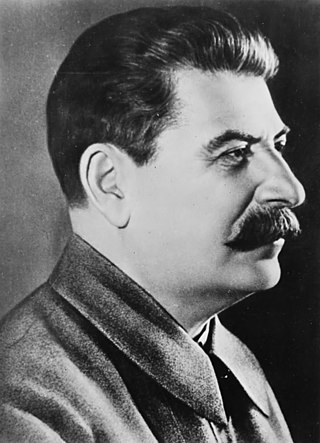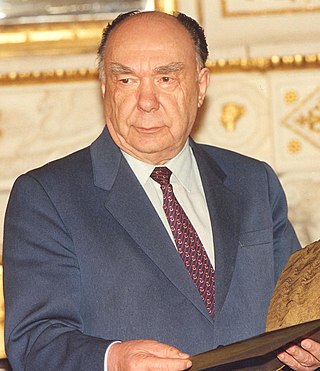Related Research Articles

The General Secretary of the Central Committee of the Communist Party of the Soviet Union was the leader of the Communist Party of the Soviet Union (CPSU). From 1924 until the country's dissolution in 1991, the officeholder was the recognized leader of the Soviet Union. Officially, the General Secretary solely controlled the Communist Party directly. However, since the party had a monopoly on political power, the General Secretary de facto had executive control of the Soviet government. Because of the office's ability to direct both the foreign and domestic policies of the state and preeminence over the Soviet Communist Party, it was the de facto highest office of the Soviet Union.

Alexander Nikolayevich Yakovlev was a Soviet and Russian politician, diplomat, and historian. A member of the Politburo and Secretariat of the Communist Party of the Soviet Union throughout the 1980s, he was termed the "godfather of glasnost", and was the intellectual force behind Mikhail Gorbachev's reform programme of glasnost and perestroika.

Stephen Frand Cohen was an American scholar of Russian studies. His academic work concentrated on modern Russian history since the Bolshevik Revolution and Russia's relationship with the United States.
Throughout the history of the Soviet Union, tens of millions of people suffered political repression, which was an instrument of the state since the October Revolution. It culminated during the Stalin era, then declined, but it continued to exist during the "Khrushchev Thaw", followed by increased persecution of Soviet dissidents during the Brezhnev era, and it did not cease to exist until late in Mikhail Gorbachev's rule when it was ended in keeping with his policies of glasnost and perestroika.
Neo-Stalinism is the promotion of positive views of Joseph Stalin's role in history, the partial re-establishing of Stalin's policies on certain or all issues, and nostalgia for the Stalinist period. Neo-Stalinism overlaps significantly with neo-Sovietism and Soviet nostalgia. Various definitions of the term have been given over the years.
Sergei M. Plekhanov is associate professor of political science at York University in Toronto, Ontario, Canada and a former deputy director of the Institute for US and Canadian Studies in Russia.
Robert Charles Tucker was an American political scientist and historian. Tucker is best remembered as a biographer of Joseph Stalin and as an analyst of the Soviet political system, which he saw as dynamic rather than unchanging.

Richard Sakwa is a British political scientist and a former professor of Russian and European politics at the University of Kent, a senior research fellow at the National Research University-Higher School of Economics in Moscow, and an honorary professor in the Faculty of Political Science at Moscow State University. He has written books about Russian, Central and Eastern European communist and post-communist politics.
Jerry Fincher Hough was an American political scientist. Hough was the James B. Duke Professor of Political Science at Duke University and his research focused on domestic American politics, the Soviet Union, the democratization of Russia, and American efforts at nation-building. Hough is a part of the "revisionist school" on Soviet history, maintaining that the level of terror was much exaggerated and that the Soviet Union was institutionally weak under Joseph Stalin, among other things. He saw the focus of his research and teaching as "the relationship of long term economic development and political institutions". In his final decade he focused on "the American experience in order to better understand the way that states, markets, and democracies develop and the way in which effective and stable ones can be created and maintained."
Archibald Haworth Brown, is a British political scientist. In 2005, he became an emeritus professor of politics at the University of Oxford and an emeritus fellow of St Antony's College, Oxford, where he served as a professor of politics and director of St Antony's Russian and East European Centre. He has written widely on Soviet and Russian politics, on communist politics more generally, on the Cold War, and on political leadership.

Russian nationalism is a form of nationalism that promotes Russian cultural identity and unity. Russian nationalism first rose to prominence as a Pan-Slavic enterprise during the 19th century Russian Empire, and was repressed during the early Bolshevik rule. Russian nationalism was briefly revived through the policies of Joseph Stalin during and after the Second World War, which shared many resemblances with the worldview of early Eurasianist ideologues.
Communism is a left-wing to far-left sociopolitical, philosophical, and economic ideology within the socialist movement, whose goal is the creation of a communist society, a socioeconomic order centered around common ownership of the means of production, distribution, and exchange that allocates products to everyone in the society based on need. A communist society would entail the absence of private property and social classes, and ultimately money and the state.
Vadim Valentinovich Zagladin was a Soviet and Russian politician and ideologist and one of the leading theoreticians of perestroika. He was a collaborator and adviser to Leonid Brezhnev and Mikhail Gorbachev and, among Soviet politicians, one of those who was the closest to Western Europe. A personal friend of François Mitterrand, Willy Brandt and Giorgio Napolitano, Zagladin was the theorist of a reformed communism that would be very close to European social democracy.

Taras Kuzio is a Professor of Political Science at the National University of Kyiv-Mohyla Academy. His area of study is Russian and Ukrainian political, economic and security affairs.

Mark Galeotti is a British historian, lecturer and writer on transnational crime and Russian security affairs and director of the consultancy Mayak Intelligence. He is an honorary professor at the UCL School of Slavonic and East European Studies, a senior associate fellow at the Royal United Services Institute, and an associate fellow in Euro-Atlantic geopolitics at the Council on Geostrategy.
The full understanding of the history of the late Soviet Union and of its successor, the Russian Federation, requires the assessment of the legacy of Leonid Brezhnev, the third General Secretary of the Central Committee of the Communist Party of the Soviet Union (CPSU) and twice Chairman of the Presidium of the Supreme Soviet. Leonid Brezhnev was the leader of the CPSU from 1964 until his death in 1982, whose eighteen-year tenure was recognized as the time of social and economic stagnation in the late Soviet Union.

Angela E. Stent is a British-born American foreign policy expert specializing in US and European relations with Russia and Russian foreign policy. She is professor emerita of Government and Foreign Service at Georgetown University and senior advisor and director emerita of its Center for Eurasian, Russian, and East European Studies. She is also a non-resident senior fellow at the Brookings Institution. She has served in the Office of Policy Planning in the US State Department and as National Intelligence Officer for Russia and Eurasia.

Karen Dawisha was an American political scientist and writer. She was a professor in the Department of Political Science at Miami University in Oxford, Ohio, and the director of The Havighurst Center for Russian and Post-Soviet Studies.
This is a select bibliography of English language books and journal articles about the post-Stalinist era of Soviet history. A brief selection of English translations of primary sources is included. The sections "General Surveys" and "Biographies" contain books; other sections contain both books and journal articles. Book entries have references to journal articles and reviews about them when helpful. Additional bibliographies can be found in many of the book-length works listed below; see Further Reading for several book and chapter-length bibliographies. The External Links section contains entries for publicly available select bibliographies from universities.
Individuals and events related to 1921 in the Civil War-era Russia.
References
- ↑ Stephen Leonard White, a SAGE Publications author's profile
- 1 2 3 4 "Professor Stephen White", at the University of Glasgow website (retrieved January 12, 2018)
- 1 2 3 WHITE Stephen , World Who's Who
- ↑ About the author of the book Political Culture and Soviet Politics, 1979
- ↑ About the author of Understanding Russian Politics, 2011
- ↑ Professor Stephen Leonard White FBA FRSE
- ↑ Professor Stephen White at British Academy website